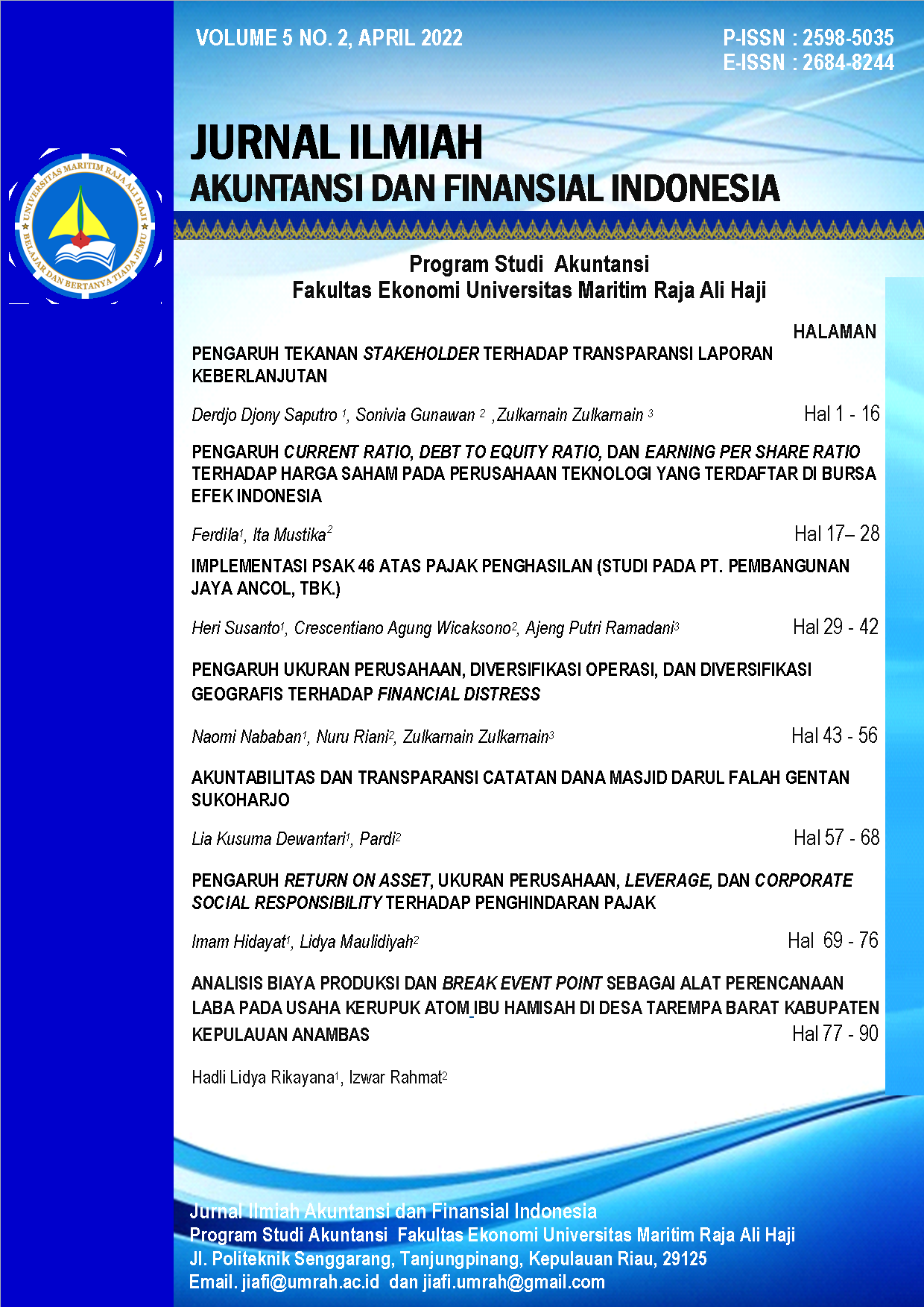Pengaruh Ukuran Perusahaan, Diversifikasi Operasi, dan Diversifikasi Geografis terhadap Financial Distress
DOI:
https://doi.org/10.31629/jiafi.v5i2.4201Keywords:
financial distress, firm size, operational diversification, geographical diversificationAbstract
This study was conducted to obtain empirical evidence of the effect of firm size, operating diversification, and geographic diversification on financial distress. The research sample is Textile and Garment Sub-sector companies listed on the Indonesia Stock Exchange for the 2016-2019 period. The sample selection technique used purposive sampling method with predetermined criteria, to obtain a sample of 15 companies with four periods and a total of 60 observations. Data analysis used logistic regression analysis with SPSS version 25 software. The results showed that company size, operating diversification, and geographical diversification had no effect on financial distress.
Downloads
References
Barney, J. B., & Hesterly, W. S. (2010). Strategic management and competitive advantage: Concepts. Prentice Hall Englewood Cliffs, NJ, USA.
Brigham, E., & Houston, J. F. (2009). Fundamentals Of Financial Management (Twelfth Edition). Cengage Learning.
Christine, D., Wijaya, J., Chandra, K., Pratiwi, M., Lubis, M. S., & Nasution, I. A. (2019). Pengaruh profitabilitas, leverage, total arus kas dan ukuran perusahaan terhadap financial distress pada perusahaan property dan real estate yang terdapat di bursa efek indonesia tahun 2014-2017. Jesya (Jurnal Ekonomi Dan Ekonomi Syariah), 2(2), 340–350.
Eminingtyas, R. (2017). Pengaruh Ukuran Perusahaan, Likuiditas, Leverage, Sales Growth dan Operating Capacity terhadap Financial Distress pada Perusahaan Manufaktur (Terdaftar di BEI). STIE PERBANAS SURABAYA.
Fahmi, I. (2015). Analisis Laporan Keuangan. Alfabeta.
Febriyan, F. (2018). Pengaruh Arus Kas Operasi, Likuiditas, Leverage, Diversifikasi, dan Ukuran Perusahaan terhadap Financial Distress (Studi Empiris pada Perusahaan Manufaktur Sektor Aaneka Industri yang Terdaftar di BEI periode 2014-2016). Thesis.
Gama, A. P. M., & Geraldes, H. S. A. (2012). Credit risk assessment and the impact of the New Basel Capital Accord on small and mediumâ€sized enterprises: An empirical analysis. Management Research Review.
Garrido-Prada, P., Delgado-Rodriguez, M. J., & Romero-Jordán, D. (2019). Effect of product and geographic diversification on company performance: Evidence during an economic crisis. European Management Journal, 37(3), 269–286.
Hanafi, M. M. (2016). Manajemen Keuangan. BPFE.
Harto, P. (2005). Kebijakan diversifikasi perusahaan dan pengaruhnya Terhadap kinerja: studi empiris pada Perusahaan publik di indonesia. Simposium Nasional Akuntansi VIII, 297–307.
Hirawati, H. (2017). Analisis Prediksi Financial Distress Berdasarkan Model Altman Dan Grover Pada Perusahaan Manufaktur Yang Terdaftar Di Bursa Efek Indonesia. Riset Ekonomi Manajemen Untidar.
Lewellen, W. G. (1971). A pure financial rationale for the conglomerate merger. The Journal of Finance, 26(2), 521–537.
Lupitasari, D., & Marsono, M. (2013). Diversifikasi Perusahaan dan Manajemen Laba. Diponegoro Journal of Accounting, 118–129.
Masak, F., & Noviyanti, S. (2019). Pengaruh karakteristik komite audit terhadap financial distress. International Journal of Social Science and Business, 3(3), 237–247.
Nora, A. R. (2016). Pengaruh Financial Indicators, Ukuran Perusahaan, Dan Kepemilikan Institusional Terhadap Financial Distress. Jurnal STIE Perbanas Surabaya.
Platt, H. D., & Platt, M. B. (2002). Predicting corporate financial distress: Reflections on choice-based sample bias. Journal of Economics and Finance, 26(2), 184–199.
Putri, D. S., & Erinos, N. R. (2020). Pengaruh Rasio Keuangan, Ukuran Perusahaan dan Biaya Agensi Terhadap Financial Distress. JURNAL EKSPLORASI AKUNTANSI (JEA), 2(1), 2083–2098.
Putri, G. S. (2020). WHO Resmi Sebut Virus Corona Covid-19 Sebagai Pandemi Global. Kompas.Com. https://www.kompas.com/sains/read/2020/03/12/083129823/who-resmi-sebut-virus-corona-covid-19-sebagai-pandemi-global?page=all
Putri, I. A. P. N. (2016). Pengaruh Diversivikasi Terhadap Kemungkinan Financial Distress Pada Perusahaan Manufaktur di Indonesia (Studi Kasus Perusahaan Manufaktur Yang Terdaftar di BEI Tahun 2009-2013). Universitas Airlangga.
Rachmawati, A., & Triatmoko, H. (2007). Analisis faktor-faktor yang mempengaruhi kualitas laba dan nilai perusahaan. Simposium Nasional Akuntansi X, 10(16), 1–26.
Rajan, R. G., & Zingales, L. (1995). What do we know about capital structure? Some evidence from international data. The Journal of Finance, 50(5), 1421–1460.
Rashid, R. (2019). Prediksi Financial Distress Dengan Pendekatan Altman Pada Perusahaan Manufaktur Di Indonesia. Jurnal Muara Ilmu Ekonomi Dan Bisnis, 3(1), 122–129.
Rosa, P., & Scott, M. (1999). Entrepreneurial Diversification, Business-Cluster Formation, and Growth. Environment and Planning C: Government and Policy, 17(5), 527–547.
Singhal, R., & Zhu, Y. E. (2013). Bankruptcy Risk, Costs and Corporate Diversification. Journal of Banking & Finance, 37(5), 1475–1489.
Sirait, R. A., & Syafri, R. A. (2020). Analisis Strategi Menyelamatkan Industri Tekstil Dalam Negeri. Buletin APBN, 5(10), 8–11. https://berkas.dpr.go.id/puskajianggaran/buletin-apbn/public-file/buletin-apbn-public-107.pdf
Su, L. D. (2010). Ownership structure, corporate diversification and capital structure: Evidence from China’s publicly listed firms. Management Decision.
Suwitno, L. (2013). Perbandingan ketepatan bankruptcy prediction models untuk memprediksi financial distress dan kepailitan pada perusahaan manufaktur yang terdaftar di Bursa Efek Indonesia. UAJY.
Suwito, E., & Herawaty, A. (2012). Analisis pengaruh karakteristik perusahaan terhadap tindakan perataan laba yang dilakukan oleh perusahaan yang terdaftar di Bursa Efek Jakarta.








